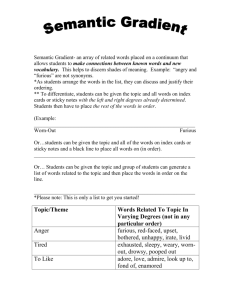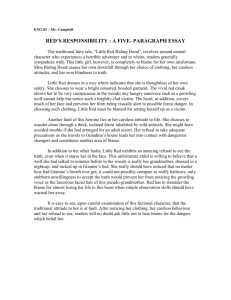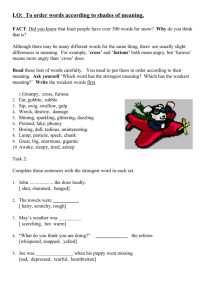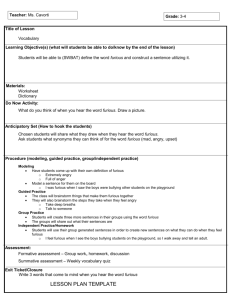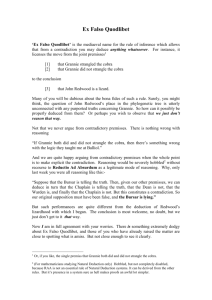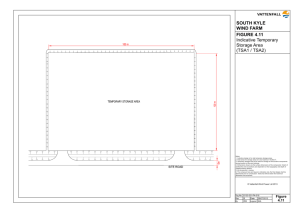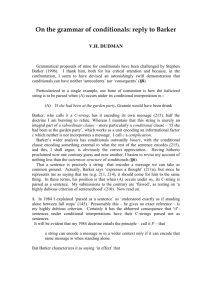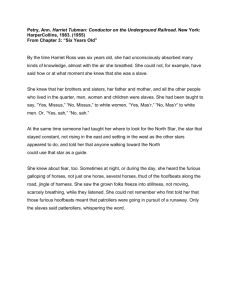Against the Indicative - University of St Andrews
advertisement
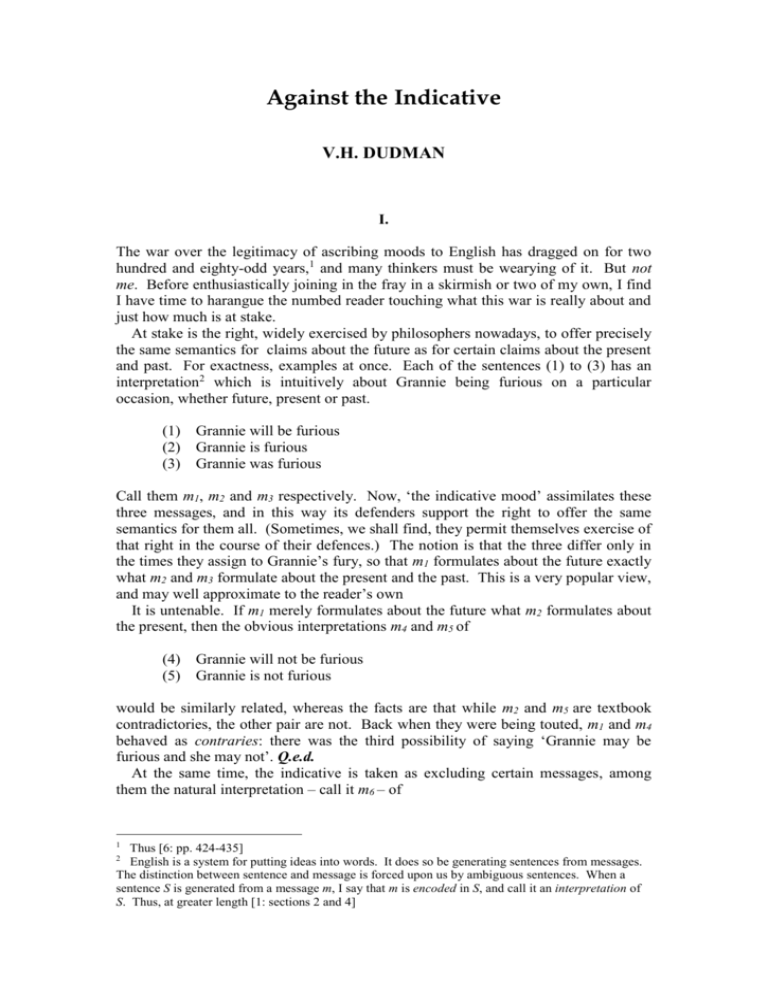
Against the Indicative V.H. DUDMAN I. The war over the legitimacy of ascribing moods to English has dragged on for two hundred and eighty-odd years,1 and many thinkers must be wearying of it. But not me. Before enthusiastically joining in the fray in a skirmish or two of my own, I find I have time to harangue the numbed reader touching what this war is really about and just how much is at stake. At stake is the right, widely exercised by philosophers nowadays, to offer precisely the same semantics for claims about the future as for certain claims about the present and past. For exactness, examples at once. Each of the sentences (1) to (3) has an interpretation2 which is intuitively about Grannie being furious on a particular occasion, whether future, present or past. (1) Grannie will be furious (2) Grannie is furious (3) Grannie was furious Call them m1, m2 and m3 respectively. Now, ‘the indicative mood’ assimilates these three messages, and in this way its defenders support the right to offer the same semantics for them all. (Sometimes, we shall find, they permit themselves exercise of that right in the course of their defences.) The notion is that the three differ only in the times they assign to Grannie’s fury, so that m1 formulates about the future exactly what m2 and m3 formulate about the present and the past. This is a very popular view, and may well approximate to the reader’s own It is untenable. If m1 merely formulates about the future what m2 formulates about the present, then the obvious interpretations m4 and m5 of (4) Grannie will not be furious (5) Grannie is not furious would be similarly related, whereas the facts are that while m2 and m5 are textbook contradictories, the other pair are not. Back when they were being touted, m1 and m4 behaved as contraries: there was the third possibility of saying ‘Grannie may be furious and she may not’. Q.e.d. At the same time, the indicative is taken as excluding certain messages, among them the natural interpretation – call it m6 – of 1 Thus [6: pp. 424-435] English is a system for putting ideas into words. It does so be generating sentences from messages. The distinction between sentence and message is forced upon us by ambiguous sentences. When a sentence S is generated from a message m, I say that m is encoded in S, and call it an interpretation of S. Thus, at greater length [1: sections 2 and 4] 2 (6) Grannie would be furious. These are assigned to a complementary mood, the ‘subjunctive’. On several ground, this taxonomy surprises. First, ‘will’ and ‘would’ are alternative inflectional forms of the same lexeme, as intimately related as ‘cat’ and ‘cats’. Astonishing to find them working for opposing moods like this. Secondly, if X affirms m1 and we want to report the fact, we give the substance of her claim as m6: X said that Grannie would be furious. One might have expected shared substance to be contrived by a common mood, but apparently No. Rather, therefore, exponents of the received view owe the world theories of mood and reported speech according to which one mood will sometimes be reported in another. Thirdly, m2 has a strict negative in m5, as we have seen; and if m1 has a negative, it is an interpretation of ‘Grannie may not be furious’, and if m6 has a negative, it is an interpretation of ‘Grannie might not be furious’. I post with dexterity to a less adventurous diagnosis: m1 belongs with the ‘subjunctives’. Observing, indeed, that (not just (1) but) every variant of (7), (8) or (9) below has an interpretation which is intuitively about Grannie being furious on a single future occasion, I conclude that any tenable account of m1 would be as a member of this whole echelon of messages about the future: (7) Grannie will/ may/ should/ ought to/ needn’t/ daren’t be furious (8) (Were she present) Grannie would/ could/ might be furious (9) (Had she been present) Grannie would/ could/ might have been furious Future-occasion interpretations of (8) and (9) are obviously and uncontentiously bound by strong family resemblances to present-occasion interpretations of (8) and (9), and past-occasion interpretations of (9). Members of this family share an intriguing property: the time t registered by the predicate – the tense of the message – is earlier than the time y that the message is intuitively about. There are five combinations, but t, whether past or pastpast, is always earlier than the future, present or past time y. This discovery is crowned by another: that m1 completes the pattern. With its present t and future y, m1 realizes the sixth and final combination for which t < y. As, of course, do all future interpretations of (7). Here is a powerful systematic reason for classifying m1 with m6 and its family, and another strike against the indicative. Having y later that t is characteristic of the echelon to which m1 belongs. I call such messages projective. An account of m1 as a projective message must sharply diverge from its received treatment. For consider: every variant of (7), (8) or (9) contains an inflectional form of a modal,3 and in each encoded message there must be a factor responsible for selecting this modal. How shall we describe this factor? Comparisons within the echelon discover a plurality of what can innocently be called verdicts about Grannie being furious, and it is evident that when a sentence is generated from a member of the echelon, the modal is chosen to express the verdict. The same comparisons reveal the verdicts as always immediate factors of these messages: ‘She should be furious’, 3 The English modals are WILL, CAN, MAY, SHALL, MUST, SHOULD, OUGHT, NEED and DARE, of which the first four each have two inflectional forms and the last five only one. See [2, esp. pp. 164-194] 2 ‘She might have been furious’. In sum, m1 differs from m2 and m3 by containing an extra immediate factor: impossible the three should be semantically indiscernible. Victory for my side would see received opinion revised and the old familiar right revoked. In received thought the subjunctive is the indicative’s de facto complement. But the two moods are not in fact jointly exhaustive. There remains unconsidered another category of simple message. Unnoticed, the various sentences (10) Grannie will/ can’t/ may/ must/ /should/ ought to/ needn’t/ daren’t/ would/ could/ might/ be furious all have interpretations with modals expressing verdicts about Grannie being furious at present, while the sentences (11) Grannie will/ can’t/ may/ must/ should/ ought to/ needn’t/ daren’t/ would/ could/ might/ have been furious have corresponding past interpretations. I call these messages practical. Comparison of (10) and (11) will discover a relationship between form and the time y which is characteristic of practical messages. We can define as simple just those messages which are encoded in subjectpredicate sentences. Now, grammatically and semantically, simple message divide into propositions and judgements, and judgements into projectives and practicals. There are two main differences between propositions and judgements. A judgement contains every factor of a proposition plus a verdict. And t and y are different points for a judgement, but identical for a proposition. To recognise a simple message as a proposition is to construe it as being about its tense.4 Indeed a proposition is a claim of fact about its tense. More exactly, t is an Aseries location of the date D of the fact alleged by asserting the sentence, this being what the message is about. Accordingly, propositions are ‘true or false’: they can be transmitted truly or falsely depending on the facts of D. m2, m3 and m5 are typical examples. Verdicts occur only as immediate factors of their messages, so a judgement is a simple message with a verdict for an immediate informational factor.5 But evidently 4 Even when a modal is used in its encodement, a message about its tense is a proposition. For instance, every variant of (12) or (13) has an interpretation about the currency at t of some propensity of Grannie’s to lose: (12) These days, Grannie will (often)/ can (sometimes)/ may (occasionally) lose (13) In those days, Grannie would (often)/ could (sometimes)/ might (occasionally) lose. Now plainly, these habitual messages are just slightly more complex variants of the obvious habitual interpretation of (14) and (15): (14) These days, Grannie (often/ sometimes/occasionally) loses (15) In those days Grannie (often/ sometimes/ occasionally) lost. So, since by general acceptation these latter message count as propositions, the former must also. And indeed, the sponsor of a variant of (12) or (13) is naturally taken as reporting a fact. Modals, we see, need not express verdicts, for in (12) and (13) they merely help to formulate a habit. It is only when the modal is used to express a verdict that we have a judgement. 5 The first semantic question raised by verdicts is whether there is anything out there to which a verdict corresponds. My own answer is No: the sponsor of a judgement is offering a personal venture of her own, which of its nature requires rational justification, and the logic of these messages is to be sought in the justifications. Thus [4; passim]. But none of this bears upon present concerns, and I can thankfully avoid the contested issue whether judgements can be ‘true or false’. 3 the verdict of a practical message relates to something’s actually happening, or holding, whereas the verdict of a projective relates to its happening or holding in a situation that can only be imagined. In illustration, ‘Grannie might have been furious’ is ambiguous between a practical interpretation to roughly the effect that maybe Grannie actually was furious, and a projective interpretation appropriate given that she actually wasn’t.6 Also, t and y are differently related. For a projective, t < y, as we have seen. For a practical message, t and y, both registered in the sentence, are independent, as dissection of (10) and (11) will confirm. In time of peace, the roles of tenses in judgements would command our investigation.7 Strict regularities relate our two categories of judgement. For instance, suppose X no sooner asserts a variant of Grannie will/ may/ should/ ought to/ daren’t be furious under a projective interpretation than is banished from the scene and kept incommunicado until after the occasion. Given that she remains of the same mind, how does she express that conviction at the later time? Why, by asserting the corresponding variant of Grannie will/ may/ should/ ought to/ daren’t have been furious under a practical interpretation! Left to itself, a verdict about the future can evidently mature into the same verdict about what actually transpired. This result looks as if it ought to be important. And it is the tip of an iceberg. A huge body of data awaits empirical investigation in these waters.8 Observe that an X who affirms m1 is by no means committed after the occasion to m3. Indeed, an incommunicado X who affirmed m3 after the event would thereby overstate. Just intuitively, affirming m3 gives the effect of reporting a fact, and an incommunicado X would be in no position to do that. Her mots justes after the event are ‘Grannie will have been furious’. This is another black eye for the indicative, for if as postulated m1 and m3 differ only in the times assigned to Grannie’s fury, it is quite unclear why the former shouldn’t ‘mature’ into the latter. So far I have attended only to simple messages at their most basic: atomic messages. II. Mostly, though, ‘indicative’ and its complement are applied to interpretations of ‘if’sentences Those concerning which there is generally received doctrine include the simple, familiar ones of It was to ensure projective interpretations for them that I sneaked ‘were she present’ alongside (8) and ‘had she been present’ alongside (9) above. Standing alone, each has an obvious practical interpretation as well. 7 [4] attempts an account of tense in projective messages. 8 Not all involve time lapse. There are straightforward inferential relations across categories. In ‘Grannie can’t have lost or she would have been furious’, for instance, the practical conclusion that Grannie can’t have lost is drawn enthymematically from the projective premise m19 and the suppressed proposition that she wasn’t furious. 6 4 (16) (17) (18) (19) If Grannie lost she was furious If Grannie loses she will be furious If Grannie was/were to lose she would be furious If Grannie had lost she would have been furious Call these m16 to m19.9 Now, by general acceptation, the ‘indicative’ unites m16 and m17, while m18 and m19 are both ‘subjunctive’. The amalgam of ‘indicative’ doctrine thus far is untenable. For (A) Someone shot Kennedy. Therefore if Oswald did not shot Kennedy someone else did encodes a valid argument, while (B) Someone will shoot Kennedy. Therefore if Oswald doesn’t shoot Kennedy someone else will does not. Persuaded that some unidentified ill-wisher, acting alone, is poised to shoot Kennedy, and with excellent prospects of success, X may well assent that someone will shoot Kennedy, but she will dissent from the future conditional inferred in (B) if she thinks the lone malefactor could be Oswald, unless she already knows of some other plot to shoot Kennedy. (A), on the other hand, encodes a straight out deduction. By assimilating the atomic premisses and the ‘conditional’ conclusions, the indicative precludes this observed logical difference; Q.e.d. On several grounds, the received taxonomy surprises. First, (17), (18) and (19) share an inflectional form of the same modal. Secondly, it makes sense to interpolate ‘as I believe’ immediately after ‘if’ in (16), but not in (17), (18) or (19). Thirdly, m17, m18 and m19 all share the same understanding as to time order, an understanding which m16 quite lacks. There is an obvious difference between saying (17) and saying If Grannie is not furious she will not lose and similarly for (18) and (19), but there is no answering difference between saying (16) and saying If Grannie was not furious she did not lose. The natural taxonomy would class m17 with m18 and m19. Indeed the natural taxonomy would assimilate a whole echelon of messages, including all the obvious single-sequence interpretations of variants of If Grannie loses she will/ may/ should/ ought to/ needn’t/ daren’t be furious If Grannie lost (was/were to lose) she would/ could/ might be furious If Grannie had lost she would/ could/ might have been furious. I call these messages conditionals. Each, we observe, invokes an understanding about time order. 9 These examples will recur, and it might benefit the reader to make a note of them now. 5 It takes a message to formulate a belief. When ‘as I believe’ is found to make sense in (16), I maintain it is because it latches onto a component message in m16, namely the proposition that Grannie lost. m16, we perceive, is a compound message: it is compounded out of two prior messages, there for all to see, each encoded in a constituent sentence of (16). Likewise natural interpretations of (20) below. But m17 is a simple message, like m1. Indeed, it is merely an elaboration of m1: m1’s verdict is about Grannie’s being furious, m17’s about Grannie’s being furious in the aftermath of her losing. So there is no component message in m17 for ‘as I believe’ to latch onto; and it is therefore, I maintain, that it makes no sense in (17). Similarly for m18 and m19.10 From this perspective, the indicative m16 is compounded out of two propositions, while m17, also indicative, is a simple judgement. An X kept incommunicado after asserting a variant of If Grannie loses she will/ may/ should/ ought to/ needn’t/ daren’t be furious can express her conviction after the event by asserting the corresponding variant of (20) If Grannie lost she will/ may/ should/ ought to/ needn’t/ daren’t have been furious another result of apparent semantic significance. Interpretations of (20) remind us that the ground still remains uncovered by our examples: practicals can figure in interpretations of ‘if’-sentences. But of course the received taxonomy leaves this whole area uncovered. Nor does it recognise ‘habituals’. Examples like ‘If baby cries we beat him’ are ignored.11 III. Both taxonomies discern m16 and m19. Just as well: Ernest Adams established their semantic difference beyond peradventure with his Oswald-and-Kennedy examples, secure starting point for any taxonomy. The strategy thereafter, for an indicative supporter, would be to assimilate m17 to m16, and m18 to m19. Submissions of this tendency are found in an argument from Frank Jackson, who urges a respect in which, as a matter of observation, m17 stands to m18 as m16 stands to m19. 10 Ramsey evidently had messages like m17 in mind in his well-thumbed footnote beginning If two people are arguing ‘If p will q?’ ... [7, p. 143fn.] The ‘Ramsey Test’ involves ‘adding p hypothetically’ to one’s stock of beliefs: see [8, p. 43] But there is no believable p in any of m17 to m19. 11 Nor does it notice embarrassing examples like interpretations of If Sly Pete will call, he will win different from the natural interpretation of If Sly Pete calls he will win, but sufficiently like it to count as indicative, too: whereupon we have different indicative conditionals with presumably the same ‘antecedent’ and ‘consequent’. Evidently the indicative is smarter than we thought. We need to hear more from those many thinkers who venture a single semantics for indicative conditionals in terms of their antecedents and consequents. Interpretations of If Sly Pete would call he would win create the same embarrassment for the subjunctive. It may be that these unusual examples are of scant logical or philosophical interest. Nevertheless, no taxonomy with pretensions to adequacy can afford to ignore them. 6 The passage we are to examine articulates a certain differentium between ‘indicative conditionals’ and ‘subjunctive conditionals’. See [5, p. 74f.]. First, the difference is discovered between ‘past subjunctives’ and ‘past indicatives’. It involves comparison with how things are. How things ‘actually are’ to be precise: It is perfect sense to say that if Oswald had not shot Kennedy, things would be different today from the way things actually are . . . . It is, on the other hand, nonsense to say indicatively that if Oswald did not shoot Kennedy, things are different from how they actually are. In the continuation, Jackson turns to a future pair like m17 and m19, looking for the same difference. But lo! unheralded and unsung, a change: this time the comparison is with how things ‘actually will be’: Despite the fact that you regard rain as unlikely, and so think that the way things actually will be is that the match will be played, you do not say ‘If it rains, things will be different from the way they actually will be’, that’s nonsense; rather you say ‘It it rains, things will be as they actually will be, and that way is that the match will be cancelled’. By contrast, there is nothing wrong with saying in the subjunctive ‘If it were to rain, things would be different from the way they actually will be’ or ‘If it had rained, things would have been different from the way they actually were’. There is much here to discuss. But my first point is that this whole exercise is underwritten by the indicative doctrine that m1 merely formulates about the future what m2 and m3 formulate about the present and past. What else could justify the equivalent roles confidently assigned to ‘actually are’, ‘actually were’ and ‘actually will be’ in the comparisons? In the passage the adverb ‘actually’ is reserved for use with ‘are’, ‘were’ and ‘will be’, in exact accord with the adage that actuality is the preserve of the indicative, But not in accord with usage at large, where ‘If Hitler had actually invaded England . . .’ and ‘. . . Germany would have actually won the war’ are both attested, where someone maintaining ‘Sly Pete will actually win’ just when Sly Pete is shot dead will switch like as not to saying ‘Sly Pete would actually have won’, and where ‘actually’ can be inserted without solecism at any of the marked places in If she ( ) returned tomorrow, things would ( ) be different from how they would ( ) have been if she had never ( ) left in the first place. We must take it then, that Jackson’s submission does not rely on facts about usage. Rather, he must be ignoring the profligacy with which some English speakers fling ‘actually’ around, and reserving the adverb to a considered use of his own. This seems an eminently reasonable reaction. Why, I myself teach that messages like m2 and m3 are transmitted truly or falsely depending exactly on how things actually are or were. If Jackson would only keep ‘actually’ away from projective messages, I should think his considered use would pretty well coincide with mine. Now plainly, if there is an argument for taking m17 to m18 as m16 to m19, Frank Jackson’s considered habits with ‘actually’ can play no part in it. And indeed with ‘actually’ deleted from the passage there is no difficulty in discerning such an argument. It resorts to the notion of things being different. 7 It is ‘nonsense’ to say that things are different from how they are, or will be different from how they will be. Perhaps this twice-invoked premise instances a little general law: crudely, things M different from how they N is always nonsense when ‘M’ = ‘N’. Ah, but that is before we let in if-conditions, with their attendant ambiguities of scope. What if it rains? Things will be exactly as they will be? Not necessarily. Here, on my right, are how things will be: no rain, and match played. And here on my left are things as they will be if it rains: match cancelled. And as you can see, they are different. On this construal, If it rains, things will be different from how they will be seems no more nonsensical than the run of such speculations. For that matter, consider modus tollens. When X infers that Grannie did not lose from the co-premisses that Grannie was not furious and m16, is she not arguing from a difference between how things were and how things were if Grannie lost? In sum, Jackson discovers no difference that I can see among his examples. Particularly, there is no solecism in maintaining both that the match will be played and that if it rains the match will not be played. Whether Jackson is denying this here is obscured from me by the ‘things being different’ conception. Of course it would be requisite to also maintain that it will not rain, which shows that the two tenets are not wholly unconnected. But one’s reasons for thinking that it will not rain are utterly unconnected from one’s reasons for thinking that the match will be cancelled if it rains, and there is no difficulty in maintaining them both. It is true that one also encounters ‘The match will be played’ in harness with the ‘subjunctive’ interpretation of If it rained (was/ were to rain) the match would be cancelled favoured by Jackson. For that matter, when the day of the match dawns bright and clear, one may even find ‘The match will be played’ coupled with another ‘future subjunctive’: If it had rained, the match would have been cancelled. And in all three cases, not just the first, it would need to be maintained simultaneously that it will not rain. In time of peace these matters would command our attention. Suffice it here that the all-‘future indicative’ combination does occur. Notably in urgent matters: a nurse who is confident that the patient will not die can also be confident that he will if the surgeon doesn’t operate. But wait: we are overlooking another such result. For although we can maintain both that the surgeon will operate and that the patient will die if he doesn’t, we never say (21) If the surgeon did not operate the patient died while committed to the proposition that the surgeon operated. True, that proposition is inferred when (21) is used in modus tollens. But of course that happens only after 8 (21)’s assertion. ‘The surgeon operated and if he didn’t the patient died’ is nonsense.12 A real difference at last in what we do and don’t say! But one which sunders m16 and m17, lobbing the burden of proof straight back into the court occupied by Jackson and those many thinkers whose easy preconceptions he defends. IV. To my best awareness, no-one, in almost three centuries, has succeeded in wresting a serious definition of the indicative from its teeming supporters. Ironical, that: I can delineate the received extensions of ‘indicative’ and ‘subjunctive’ exactly, in independently explained grammatical terms. But traditional expositions, rare anyway, tend to stall at the level of words, powerless to exclude (for example) the practical interpretation of It would have been last Thursday from the ranks of their subjunctive. And the traditional conception of what makes indicatives indicative must remain a matter for speculation. I, of course, recognise ‘subjunctives’ as past-tensed projectives. And ‘the indicative’, tonight’s topic, stands revealed as the union of propositions, certain but not all past-tensed projectives, and certain but not all compound messages. Small wonder its essence has eluded the tradition. At least the subjunctive is homogenous. Limited, mind, for a basic category. Past-tensed projectives are one kind of projective, and projectives are one kind of judgement, and judgements are one kind of simple message, and simple messages are one kind of message: taxonomically the subjunctive is exactly that important. But indubitably whole. Whereas the indicative is a monster, born of the illicit desire for future-y analogues to m3 and m16. References 1. 2. 3. 4. 5. 6. 7. 8. V.H. Dudman, ‘Conditional Interpretations of ‘If’-sentences’, Australian Journal of Linguistics 4, (1984) pp. 143-204. V.H. Dudman, ‘Towards a Theory of Predication for English’, Australian Journal of Linguistics 5, (1985) pp. 143-196. V.H. Dudman, ‘Antecedents and Consequents’, Theoria 52 (1986) PP.168-199 V.H. Dudman, ‘On Conditionals’, forthcoming, Journal of Philosophy 91, March 1994 Frank Jackson, Conditionals (Oxford: Blackwell, 1987). Ian Michael, English Grammatical Categories and the Tradition to 1800 (Cambridge: Cambridge University Press, 1970). F.P. Ramsey, Foundations, (ed.) D.H. Mellor (London: Routledge, 1978) Robert C. Stalnaker, ‘A Theory of Conditionals’ in Ifs (eds.) W.L. Harper et. al. (Dordrecht: Reidel, 1981) pp. 41-55. That is why the argument ‘Oswald shot Kennedy; therefore someone shot Kennedy; therefore if Oswald did not shoot Kennedy someone else did’ fails despite its two impeccable inferences. So generally for ‘A so A or B so if not-A B’. Every semantics for compound interpretations of ‘if’sentences needs to explain why one cannot say ‘if not-A . . .’ while maintaining that A. I attempt this at [3, p. 183]. Incidentally, any who thought to apply the ‘Ramsey Test’ to messages like m16 would need to explain why ‘Grannie won, but if she lost she was furious’ is nonsense, but ‘I believe Grannie won, but if she lost she was furious’ is not. 12 9
